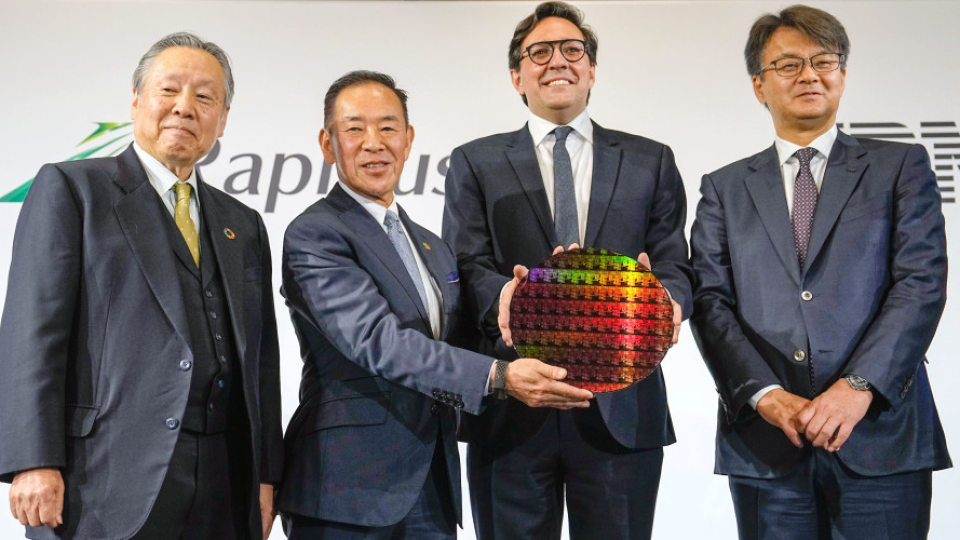Japan's Rapidus, IBM team up to produce next-generation chips

New Japanese semiconductor producer Rapidus Corp. and IBM Corp. said Tuesday they have signed a strategic partnership deal to jointly develop technologies to manufacture next-generation computer chips amid heated rivalry between the United States and China.
Rapidus, a chip maker backed by the Japanese government, aims to produce 2-nanometer chips at home starting in 2027 in cooperation with the U.S. tech giant, which unveiled breakthrough nanosheet technology last year, paving the way for the 2 nm node.
It is possible to build “a more resilient supply chain that better balances geopolitical risk” by diversifying production bases, said Dario Gil, senior vice president and director of research at International Business Machines Corp., at a press conference in Tokyo.

Rapidus Corp. President Atsuyoshi Koike (2nd from L), IBM Corp. Senior Vice President Dario Gil (3rd from L) and others pose for photos during a press conference in Tokyo on Dec. 13, 2022. (Kyodo)
In October, the United States unveiled a sweeping set of export controls on certain high-end chips that could improve Beijing’s military capability. The U.S. government asked its allies to follow suit.
The issue of supply chain resiliency has been under the spotlight after the COVID-19 pandemic significantly disrupted global supply chains, which caused shortages of semiconductors. The risk of disruptions has also heightened due to Russia’s war in Ukraine.
The Japanese government sees domestic chip production as critical to its economic security, with dependence on major supplier Taiwan posing geopolitical risks amid tensions between the United States and China over the self-ruled island. A potential crisis in the region could lead to Japan losing access to semiconductor supplies.
Rapidus, established by Toyota Motor Corp., Sony Group Corp. and six other companies, and IBM said they will jointly develop the cutting-edge technology at the Albany Nanotech Complex in New York.
Rapidus will join in research and development at the nanotech complex, one of the world’s most advanced semiconductor research facilities, where major chip industry companies like Applied Materials Inc., Samsung Electronics Co. and Tokyo Electron Ltd. have their R&D operations.
“It is a long-awaited international partnership and is essential for Japan to play a truly crucial role again in the semiconductor supply chain,” Rapidus President Atsuyoshi Koike said.
Japanese chip manufacturers were once dominant players in the industry in the 1980s but now lag behind leading chipmakers from countries such as Taiwan and South Korea.
In an effort to boost Japan’s competitiveness in the chip sector, Rapidus was set up in August this year through a 7.3 billion yen ($53 million) investment by Toyota Motor Corp., Sony Group Corp. and six other major Japanese companies.
Rapidus, tasked with the research, development, design, manufacturing and selling of advanced logic semiconductors, will also be given 70 billion yen by the Japanese government in subsidies as part of its semiconductor strategy.
Besides IBM, Rapidus has joined hands with a Belgian nanotechnology developer known for extreme ultraviolet lithography, which is essential for creating advanced semiconductors.
Related coverage:
Japan’s Rapidus, Belgium institute join hands on advanced chip R&D
FOCUS: East Asia chipmakers see high-tech decoupling with China inevitable
FOCUS: New Japanese chipmaker Rapidus joins development, investment race



